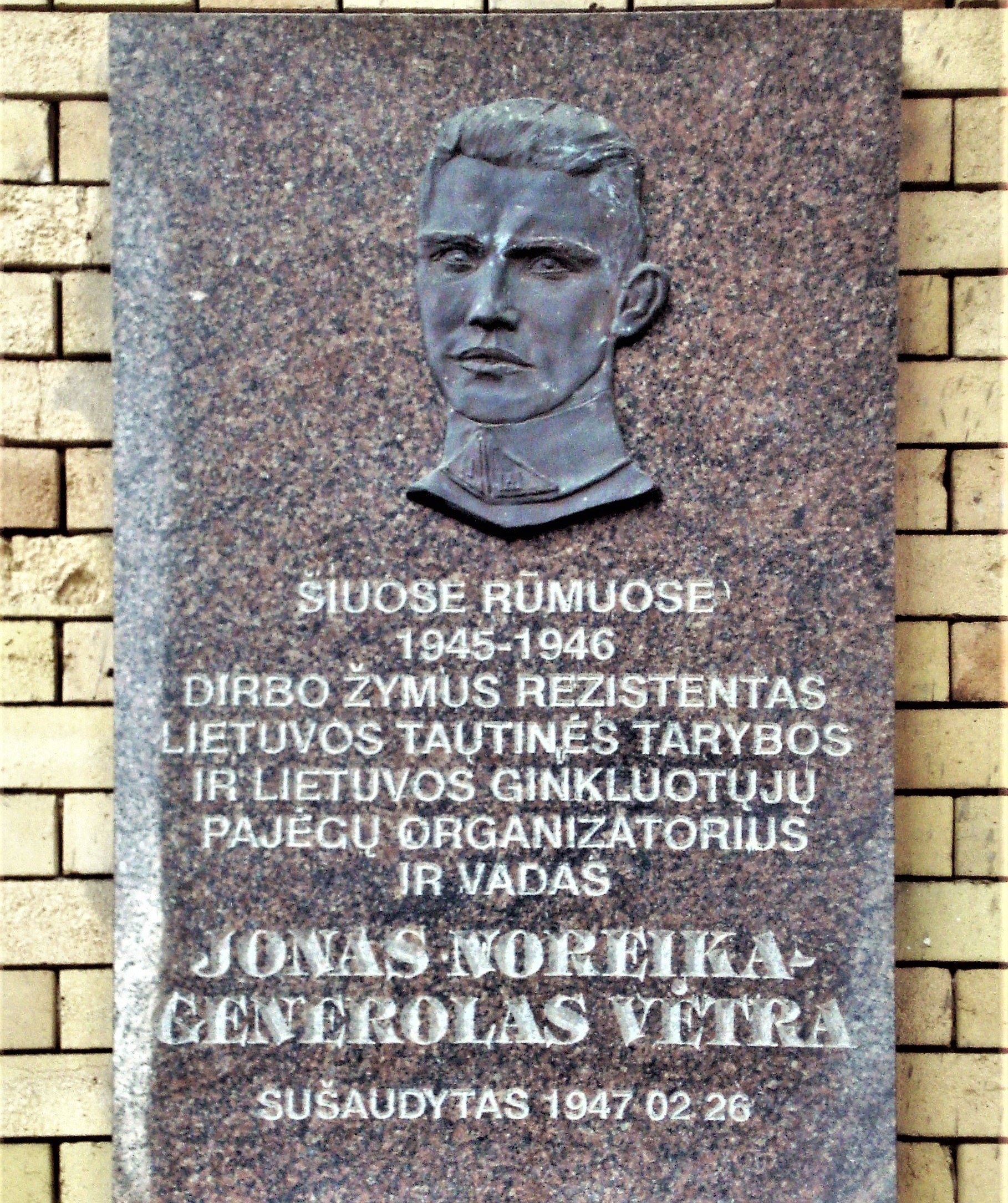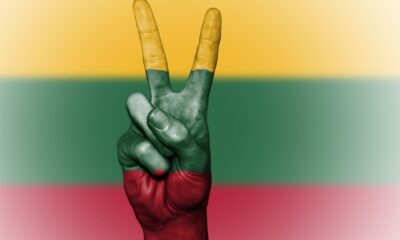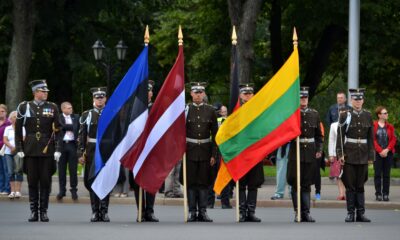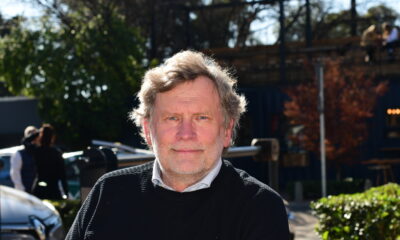
Holocaust

Noreika plaque flies in face of Holocaust apologies
Published
12 months agoon
By
Peta KrostOne of Lithuania’s most controversial plaques – for Litvaks (Jews descended from Lithuania) anyway – was overnight no longer in its pride of place in Vilnius, Lithuania. It had been quietly removed.
The plaque, on the façade of the Vilnius Library of Academy of Science, honours General Jonas Noreika for his fight against the Soviets. However, there’s clear evidence that Noreika was one of the leaders behind the wholesale slaughter of Jews in Lithuania during the Holocaust in 1941.
That year, a large percentage of the 220 000 Jews murdered in Lithuania during the Holocaust were killed at the hands of mostly local Lithuanians.
According to Dr Efraim Zuroff, chief Nazi hunter of the Simon Wiesenthal Center (SWC), there were only 1 000 Nazis in the country in the year that most Jews were shot. It would have been impossible for them to have shot that many people without the help of the local population, he says. “We estimate there were about 25 000 Lithuanians involved,” said Zuroff, who co-ordinates SWC Nazi war-crimes research worldwide. They exterminated 94% of the Jewish population, known as the “most successful Holocaust in Europe”, he said.
Zuroff was adamant that any celebration of the killers of Jews was unacceptable, and any such plaques should never have been there in the first place.
In the case of Noreika, his own granddaughter, Silvia Foti, wrote an autobiographical account of how she had sought to clear his name by writing his story but couldn’t because she found evidence to prove his guilt. She, too, called for this plaque to be removed.
And South African-born Grant Gochin has had numerous court cases against the Lithuanian government to remove this plaque, among other commemorative plaques in Noreika’s honour, because he was “a murderer of Jews, and so clearly no hero”.
Both Foti and Gochin’s stories and battles were documented in J’Accuse, an award-winning documentary by Michael Kretzmer that was shown on a SA Jewish Report webinar recently.
Two weeks ago, the plaque was seen to be covered, apparently to protect it as there was scaffolding on the wall around it. Over this weekend, though, without any fanfare or coverage, it was removed.
However, there’s no cause to celebrate, as Library Director Sigitas Narbutas said on 2 May that the board was removed due to repair work on the library’s façade, and would be replaced once the work was complete.
Back in July 2019, the plaque was also quietly removed one night by the Vilnius City Municipality. The then mayor of Vilnius, Remigijus Šimašius, said he made the decision to remove the plaque based on the fact that Noreika, as chief of the Šiauliai district, confirmed decisions of the Nazi administration to establish a Jewish ghetto and confiscate their property. His decision caused outrage among many Lithuanians, who refuse to see Noreika as anything but a hero. They protested in front of the presidential palace in Vilnius against the decision.
The General Prosecutor’s Office (GPO) found that Šimašius had exceeded his power in ordering the removal of the plaque. The mayor responded, saying that he was worried that this decision would be seen to be “justifying the worship of persons who contributed to the Holocaust in Lithuania by their actions”.
Long before the GPO’s decision was made, a new sign had been hung in place of the first one on the façade of the library.
Ultranationalist Holocaust-revisionist organisation Pro Patria had a new plaque made and, to great fanfare, put it where the old one had been.
This past weekend, that plaque was handed over to Pro Patria for safekeeping until it could be reattached.
The hero worship of Lithuanians who were involved in the killing of Jews during the Holocaust is a bone of contention for Litvaks around the world, not least those living in South Africa. There are said to be numerous plaques, statues, street names, and other honours in their names. However, the most well-known are Noreika and Juozas Krikštaponis, who led the shooting of Jews in Rudensk, Belarus. There’s a statue of him in the centre of Ukmerge, Lithuania.
The deputy chancellor of Lithuania and advisor to the prime minister, Rolandas Krisciunas, told the SA Jewish Report that it was “impossible to sidestep these issues because of the horror of what was done to Jews in this country – the tragedy is mind blowing”.
He said he was aware of only two such cases of plaques and statues commemorating such people, namely those of Noreika and Krikštaponis. With the latter, he said there was agreement about his involvement in the mass killing of Jews, but the government was yet to be convinced about Noreika, and awaited confirmation by its own historians.
However, Krisciunas said he and the government believed there shouldn’t be any statues or plaques to honour people involved in the killing of Jews. But it wasn’t the jurisdiction of national government to order the removal of these statues and plaques as it fell in the ambit of municipalities or local government.
“As for Krikštaponis, it won’t be long before his memorial comes down, and I believe the rest will follow. I don’t want to overpromise and under deliver, but it will happen, because people who were involved in killing Jews cannot be held up as heroes.”
Viktorijos Čmilytės-Nielsen, the speaker of Lithuanian parliament, told the SA Jewish Report that she believed that “no matter what you may have done in one area, you’re disqualified from ever being called a hero if you took part in the killing of Jews”.
She maintained that the issue of Noreika was in the hands of the Lithuanian historians to ascertain his role, and the rest would follow. “Such things take time to change, but, of course, I’m not in a position to make a promise when it will happen because it is not in my hands,” she said.
The Lithuanian Ambassador to South Africa, Dainius Junevičius, was adamant that the Noreika plaque should stay down.
“Although the biography of Jonas Noreika is well researched, the debate between the public and historians about his place in Lithuanian history will probably never end. For some, the facts on the memorial plaque outside the building where he worked [now the library] will be important: he organised armed resistance to the Soviet occupation, and was killed by the Soviet authorities for this.
“However, his admirers mustn’t turn a blind eye to the fact that he was involved in the murder of Jews while working as a head of the Šiauliai district of the German occupation civil administration in 1941-1943.
“In my opinion, this is completely unjustifiable, and no other real or perceived merit can wash away this sin,” the ambassador said. “We Lithuanians cannot be unconditionally proud of such individuals, and the memorial plaque is an example of such pride.”











rosalie Donadio
May 4, 2023 at 2:27 pm
My grandmother’s brother and his family were shot in Birze Aug of ’41; it makes me ill to think that many neighbors were involved and to add insult to injury were “lauded” for their contributing efforts. I feel better knowing that Lithuanians removed the plaque.
Hilary Ginsberg
May 6, 2023 at 9:22 am
My late dad left most of his family in Plunge when he came tomSouth Africa. One brother and one sister had come earlier. Another brother went to Israel in the seventies. He had other siblings who perished in Lithuania with his mother.
It haunted him forever and we , his children, never really knew the extent of the evil that took place there.
He mentioned the putting of 2000 Jews in the synagogue and killing them. I wish he was alive to know this..
Thank you for all that you have done in exposing these atrocities!
Grant Gochin
May 12, 2023 at 7:27 am
I posted my reply to this article here:
https://blogs.timesofisrael.com/there-is-no-basis-for-trust/